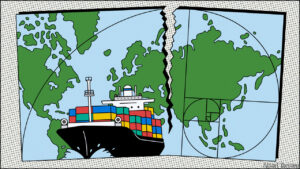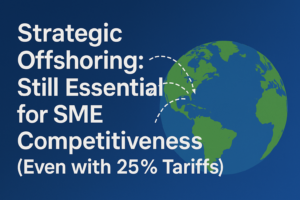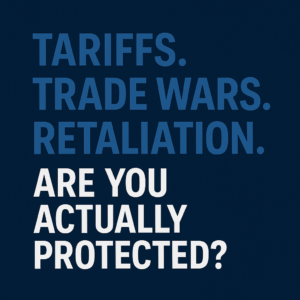
Current News:
“The Wall Street Journal recently reported that companies rethinking their supply chains are embracing strategies that move beyond nearshoring, with many executives warning that single-country sourcing is a risky proposition.”
— The Wall Street Journal, WSJ – Rethinking Supply Chains
As the post-pandemic recovery unfolds, manufacturing executives are scrambling to build supply chains that can withstand future shocks. The Wall Street Journal’s recent feature on supply chain resilience highlights that relying solely on domestic or nearshored production not only limits flexibility but also exposes companies to escalating risks—including retaliatory tariffs and localized disruptions.
This current sentiment is echoed across major business networks and social media discussions, where industry leaders stress that single-country sourcing—whether on-shored or nearshored—can undermine quality and erode pricing competitiveness. In light of these concerns, a growing number of manufacturers are turning to managed offshoring. This strategy offers a robust framework, enabling companies to distribute risk across multiple geographies without sacrificing operational excellence.
REDUxEngineering embodies this paradigm shift. By providing a fully managed offshoring service, they connect manufacturers with a network of trusted contract manufacturers in key global markets. Their approach offers several distinct advantages:
- Multi-Regional Flexibility: Instead of being tied to one region, manufacturers can quickly shift production as needed, ensuring that no single market risk derails operations.
- Enhanced Quality and Pricing Stability: Through a diversified supplier network, companies maintain quality while avoiding the cost pitfalls associated with domestic-only production.
- Proactive Risk Management: With expert guidance available through a brief consultation, leaders can strategically balance cost efficiency with quality control.
Importantly, the debate around nearshoring and on-shoring is far from settled. Leading white papers and research from Ivy League institutions have repeatedly warned that moving production back home may generate unforeseen costs. For instance, manufacturing experts note that internal vertical integration often fails to match the specialization and efficiency of global contract manufacturing networks. Similarly, on-shoring strategies run the risk of exposing companies to retaliatory trade measures in other major markets.
In this context, REDUxEngineering’s solution stands out. By subtly integrating advanced process optimization and digital oversight tools into their overall value proposition, they present a compelling alternative. Manufacturers are encouraged to consider a managed offshoring approach as a way to not only safeguard current operations but also to build a resilient, future-proof supply chain that can adapt to shifting global dynamics.
In today’s competitive environment, the strategic choice is clear: companies that embrace a diversified, agile supply chain—supported by the expertise of a managed offshoring partner—are best positioned to improve EBITDA, maintain quality, and enhance their global market position.
SEO Hashtags (space-delimited):
#SupplyChainResilience #PostPandemic #Manufacturing #GlobalSupplyChain #Offshoring #ManufacturingInnovation #BusinessStrategy #GlobalManufacturing #ResilientSupplyChain #RiskManagement #ManufacturingTrends #OperationalExcellence #QualityControl #CostEfficiency #SupplyChainStrategy #IndustrialSolutions #WSJNews #MarketResilience #EconomicRecovery #ExecutiveInsights #BusinessConsultation #ManagedOffshoring #ProductionAgility #TradeRisks #GlobalTrade #ManufacturingNews #Innovation #SupplyChainManagement #IndustrialTrends #Resilience #CompetitiveAdvantage






